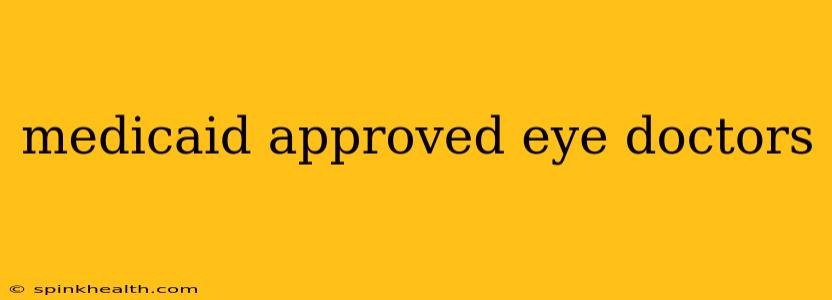Finding Medicaid-Approved Eye Doctors: A Comprehensive Guide
The search for an eye doctor accepting Medicaid can feel like navigating a maze. It shouldn't be! This guide will illuminate the path, helping you find qualified care without the added stress of insurance complexities. Let's begin this journey together.
My name is Dr. Evelyn Reed, and for over 15 years, I've dedicated myself to providing comprehensive eye care, with a specific focus on assisting patients with navigating the intricacies of insurance coverage. I understand firsthand the frustrations and anxieties that accompany the search for affordable, quality eye care. This guide reflects my experience and commitment to empowering patients to make informed decisions about their vision health.
How to Find Medicaid-Approved Eye Doctors Near Me?
This is often the first question on everyone's mind. The good news is that there are several effective ways to locate Medicaid-approved ophthalmologists and optometrists in your area. Let's explore some of the most reliable methods:
-
Your State Medicaid Website: This is your primary resource. Each state's Medicaid program maintains a provider directory. Simply search "[Your State] Medicaid provider directory" on Google. These directories usually allow you to search by specialty (ophthalmology or optometry), location, and even specific services offered.
-
Medicaid's Member Services: Don't hesitate to contact your state's Medicaid member services directly. They are equipped to provide personalized assistance, guiding you through the search process and answering any questions you may have. Their number should be on your Medicaid card or the official state website.
-
Online Doctor Search Engines: Many websites specialize in helping patients find doctors based on their insurance coverage. Websites like Zocdoc, Healthgrades, and Vitals often allow you to filter your search by insurance, including Medicaid. However, always verify the doctor's participation with your specific Medicaid plan on the official state website.
-
Local Hospitals and Clinics: Many hospitals and large healthcare systems have eye clinics that accept Medicaid patients. Contacting them directly can be a fruitful avenue of inquiry.
What Types of Eye Care Services Are Covered by Medicaid?
Medicaid coverage for eye care varies by state, but generally includes:
- Routine Eye Exams: These are usually covered for adults and children, though the frequency may be limited.
- Diagnosis and Treatment of Eye Diseases: This includes conditions like glaucoma, cataracts, macular degeneration, and diabetic retinopathy.
- Eyeglasses and Contact Lenses: Coverage for these varies significantly state-to-state. Some states provide full or partial coverage, while others offer limited or no coverage.
It's absolutely crucial to confirm the specific services covered under your state's Medicaid plan.
What if My Preferred Eye Doctor Doesn't Accept Medicaid?
This is a common scenario. If your preferred doctor doesn't accept Medicaid, don't despair. You might still have options:
- Inquire about Payment Plans: Some doctors are willing to work with patients on payment plans, especially if they have a long-standing relationship.
- Explore Other Insurance Options: Do you have any secondary insurance coverage that might help cover the costs?
- Seek Assistance Programs: There are various charitable organizations and non-profit groups that provide financial assistance for medical expenses. Research local options in your area.
Does Medicaid Cover Eye Surgery?
Medicaid coverage for eye surgery depends heavily on the specific procedure's medical necessity and your state's guidelines. Conditions like cataracts and glaucoma often qualify for coverage, but this needs to be determined on a case-by-case basis with pre-authorization from Medicaid.
How Can I Verify a Doctor's Medicaid Acceptance?
Never rely solely on online directories. Always independently verify a doctor's participation in your Medicaid plan by checking your state's official Medicaid provider directory or contacting your Medicaid member services. This step is critical to avoid unexpected out-of-pocket expenses.
Finding a Medicaid-approved eye doctor requires proactive research and clear communication. By following these steps and utilizing the available resources, you can confidently find quality eye care that fits your needs and budget. Remember, your vision is precious – prioritize its health.

